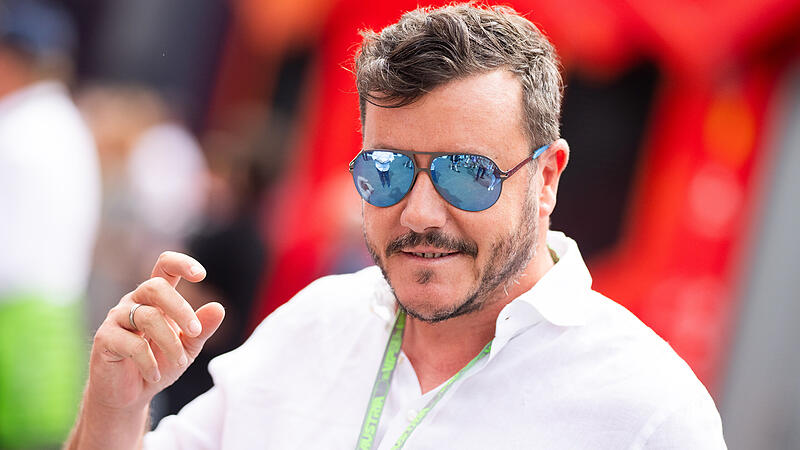Image: GEORG HOCHMUTH (APA)
The companies wrote losses, financiers turned away and demanded Benko’s withdrawal. In the end the holding company went bankrupt. Who is the man who suffered this deep fall?
The 46-year-old from Innsbruck started building his real estate empire when he was just 22 years old. According to the latest information on the group homepage, Signa Real Estate AG has a gross asset value of 27 billion euros. There is also a development volume of 25 billion euros.
According to estimates by the US magazine “Forbes”, the Signa founder’s assets had shrunk by more than half from around 6 billion to 2.8 billion dollars (around 2.6 billion euros) within just a few months by the end of November. The billionaire slipped from 425th to 1,105th place on the list of the world’s richest people.
- more on the subject: Signa Holding files for insolvency at the Vienna Commercial Court
According to “Wirtschafts-Compass”, the Benko family private foundation directly and indirectly holds around 66 percent of the now insolvent Signa Holding GmbH. The family foundation around the industrialist and ex-Strabag boss Hans Peter Haselsteiner holds another 15 percent. As the real estate group’s difficulties became more and more obvious in the fall, the value of Benko’s Signa share also fell. According to media reports, he recently also privately owned Signa properties, such as the luxury resort “Eden Reserve” on the shores of Lake Garda. Last week it was revealed that paintings by Picasso and Basquiat owned by Benko were to be monetized. By Monday, an advertisement for his 62-meter-long yacht called “Roma” was also found on the Internet with a sales price of 39.9 million euros.
Benko is said to have had his first Schilling million at the age of 20, and by the age of 40 he was a Euro billionaire and has since been one of the wealthiest Austrians.
Already caused a stir as a student
The son of a municipal employee and a kindergarten teacher caused a stir when he was still a student in the mid-1990s. As a 17-year-old, he organized the conversion of attics in a prime city location for a builder friend from Innsbruck. He also showed off the fact that he earned good money with it. A few years ago, school colleagues remembered gold chains and a leased Ferrari in the “Falter” newspaper.
In those around him, Benko was considered a “quickie” with good business instincts, a “super networker” and, above all, very willing to work – according to his own statements, he got up at half past four in the morning and worked until shortly before midnight.
Only the school didn’t take Benko that seriously. “That’s really the case, I was at school so little in the last school year, the year of the Matura, that I was no longer admitted to the Matura due to the many absences,” he said in an ORF interview many years ago.
Rich and famous people convinced
Benko managed to convince rich and famous people of his business ideas early on. Shortly after founding Immofina, from which the Signa Group, founded in 1999, later emerged, he met Stroh gas station heir Karl Kovarik, who bought into Benko’s company in 2001. With Kovarik’s money, a double-digit million sum, Signa Holding grew into one of the largest Austrian real estate companies, which has long since extended its feelers abroad, especially to Germany.
The first major deal with which the Tyrolean attracted attention in 2004 was the takeover of the Tyrol department store in Innsbruck, the best-known department store in the western state. Later, properties in Vienna’s city center such as the “Golden Quarter” including the Hotel Park Hyatt (former Landesbank headquarters), the Bank Austria Kunstforum Wien and the Österreichische Postsparkasse, designed by the Art Nouveau architect Otto Wagner, were added, as were the buildings abroad the Deutsche Börse in Eschborn, the Hotel Bauer Palazzo in Venice, a half share in the Chrysler Building in New York, the luxury department store Selfridges in London and the Globus department store in Switzerland or the Elbtower in Hamburg, where construction work recently had to be stopped because According to the construction company, Signa did not pay on time. These are just a few examples of the billion-dollar real estate empire surrounding Benko and his Signa Group.
Benko is keen on discretion when it comes to his private life
Benko is keen on discretion when it comes to his private life. The father of several families, who was married to an ex-model, limited his public statements and appearances to a minimum. His secrecy also applied to his business results – he generally did not let outsiders look into the books of his investment company Signa Holding, which was deliberately not listed on the stock exchange, and he preferred to keep the profit and reserve figures in particular to himself.
Benko liked to surround himself with celebrities from politics and business who had repeatedly entrusted him with considerable sums of money. Every year, people of distinction from business, politics, media and culture attended his autumnal Törggelen, the South Tyrolean custom of eating chestnuts and young wine. This year the dazzling event in Vienna was canceled. The entrepreneur built up a prominent network. The supervisory boards of his companies include ex-SPÖ Chancellor Alfred Gusenbauer, Wüstenrot boss and ex-FPÖ Vice Chancellor Susanne Riess-Hahn, former Bank Austria Creditanstalt boss Karl Sonntag, ex-RBI boss Karl Sevelda as well as the French businessman Robert Peugeot and the CFO of the German RAG Foundation, Jürgen-Johann Rupp.
In 2012, Benko suffered a setback when he went on trial for attempted prohibited intervention. As a result, Benko withdrew operationally from his Signa Holding, but had the majority of voting rights through his family foundations and was still considered the central decision-maker.
Trading empire expanded
The busy Tyrolean didn’t just stop at the real estate business, but gradually built up a trading empire with some very attractive properties in a central location. In 2012, he took over the famous KaDeWe department store in Berlin together with the Israeli diamond dealer Beny Steinmetz. He became known throughout Europe in 2014 with the purchase of the struggling German department store chain Karstadt. After Benko also incorporated Karstadt’s competitor Kaufhof in 2019, he merged the two department stores under the umbrella of “Galeria Karstadt Kaufhof GmbH”. What followed were payment difficulties, two protective shield proceedings, branch closures and the dismissal of thousands of employees. The shell of the luxury department store Lamarr, which is scheduled to open in 2025, is located on Mariahilfer Strasse in Vienna.
With the purchase of the Austrian furniture chains Kika and Leiner, Benko gained entry into the domestic trade. Also in 2018, Signa Holding took over a 49.5 percent stake in WAZ Ausland Holding GmbH from the German media group Funke, which in turn holds 50 percent of the “Kronen Zeitung” and almost 50 percent of the “Kurier”.
Tyrolean of the Year 2011
The “Tyrolean of the Year 2011” was not without controversy. Benko was regularly in the spotlight because of his real estate deals, the business conduct of the Signa Group, his apparent closeness to politicians and the accusation of political influence in Austria. In autumn 2022 there were house searches at the Signa Group by the Economic and Corruption Public Prosecutor’s Office (WKStA). Ex-ÖBAG boss Thomas Schmid accused Benko of offering him a job in the Signa Group if in return Schmid would “get millions of dollars in tax matters on track” for him. Benko denied all allegations.
Benko’s dealings with Galeria Karstadt Kaufhof in Germany also brought criticism because Galeria received a total of almost 700 million euros in state aid, then laid off people on a large scale and closed branches. The actions of his furniture store chain Kika/Leiner in Austria attracted similar criticism. During the corona pandemic, the Austrian state supported the furniture store group with tax deferrals amounting to 150 million euros, and the furniture retailer also put almost all 4,200 employees on short-time work.
At the beginning of June 2023, Benko withdrew from the Kika/Leiner Group, which was only taken over by the South African Steinhoff Group in 2018. His Signa Group sold the furniture chain’s properties to the Graz Supernova Group and the operational business to the trading manager Hermann Wieser. Shortly after the sale it became known that around half of the workforce would have to be laid off, and a few days later the furniture chain was declared bankrupt. The course and consequences of the largest bankruptcy of the past ten years brought the businessman back into the headlines.
2023 was not a good year
2023 was not a good year for Benko because the problems were piling up. The EU banking supervisory authority subjected the loans from banks to the Signa Group to a special audit. The downturn in the real estate market hit Signa Holding hard. High devaluations on the real estate portfolio pushed Signa Prime Selection AG’s earnings deep into the red last year. Signa Sports United, the online sporting goods retailer based around Benko, is insolvent and had to file for bankruptcy in October; the German subsidiary Signa Real Estate Management Germany GmbH opened the bankruptcy in November.
Due to growing pressure from shareholders, Benko announced in November this year that he would withdraw from the top of Signa Holding’s advisory board and hand the position over to the German restructuring expert Arndt Geiwitz. Geiwitz had previously been brought on board as a restructuring consultant and already knew the ailing department store chain Galeria Kaufhof Kaufstadt as a reorganizer in the Signa empire. At the end of November 2023, the parent investment company Signa Holding was insolvent. What followed was an application for insolvency at the Vienna Commercial Court. The aim is for restructuring with self-management. The empire, consisting of over 1,000 nested companies, sub-companies and individual properties, is reeling after almost a quarter of a century of growth, which was characterized by low interest rates and rising real estate values. The billionaire would have needed a short-term financial injection of around 500 million euros to keep the heavily indebted Signa structure alive in its current form.
My themes
For your saved topics were
new articles found.

info By clicking on the icon you can add the keyword to your topics.
info
By clicking on the icon you open your “my topics” page. They have of 15 keywords saved and would have to remove keywords.
info By clicking on the icon you can remove the keyword from your topics.
Add the topic to your topics.
Source: Nachrichten




